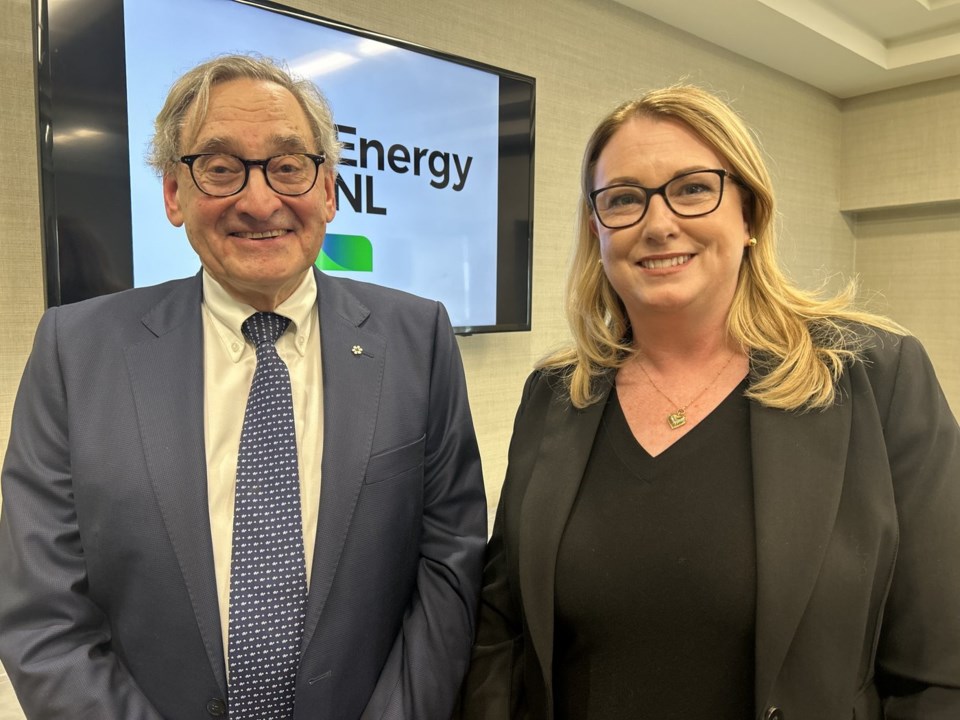ST. JOHN'S — The chief executive of Hydro‑Québec says a sweeping new energy deal with Newfoundland and Labrador Hydro is a signal to the United States that Canada can get "big things done."
Michael Sabia was in St. John's, N.L., Tuesday, where he pitched the draft deal as a turning point in Quebec's relationship with Newfoundland and Labrador, and a step toward Canada becoming an "energy superpower."
"Let's be clear: Canada is under threat," Sabia told a room full of representatives from Newfoundland and Labrador's energy industry.
"This is a time of real economic and political uncertainty. It's a time when Canadians need to work together to build the future," he said. "Ultimately, that's what this deal is about. It's about building now to secure Canada's energy future."
Sabia was speaking to the crowd at a conference held by Energy N.L., Newfoundland and Labrador's energy industry association. He was joined on stage by Jennifer Williams, president and chief executive of Newfoundland and Labrador Hydro.
The two discussed an agreement in principle announced last year that would end a contract signed in 1969 that allows Hydro‑Québec to buy the lion's share of the energy from the Churchill Falls hydroelectric plant at prices far below market value.
The contract has long been a source of bitterness in Canada's easternmost province.
The new arrangement would end the contentious deal 16 years early and see Hydro‑Québec pay for more power while developing new projects with Newfoundland and Labrador Hydro along the Churchill River. Newfoundland and Labrador would also get more power from Churchill Falls.
The memorandum of understanding has its critics. The Opposition Progressive Conservatives have been uneasy with the draft deal, demanding the Liberal government have it independently reviewed. The party also called for a halt to ongoing negotiations of final contracts, saying a proposed national energy corridor could bring better opportunities.
Some in Newfoundland and Labrador have also wondered if Hydro‑Québec can be trusted and whether the province will truly get enough value for its resources.
"Show me a deal where there hasn't ever been skeptics," Williams challenged when asked about those who have criticisms.
Sabia addressed the tangled history of the provinces several times, and said repeatedly that the new arrangement was "balanced" and served the needs of both Newfoundland and Labrador and Quebec. Both sides made concessions, he said, adding that the deal contained items neither side wanted.
He refused to elaborate on what those were.
Sabia said the agreement is the "single most important signal we can send to the United States right now," as long as it goes ahead as planned. Williams agreed the proposed projects need to proceed smoothly and quickly, repeating "rigour and speed are not incompatible."
Both said they were heartened by signs from Prime Minister Mark Carney that he would speed up project approvals.
Williams touted the deal's promised economic benefits, which includes $17 billion in revenue to the provincial treasury by 2041. Newfoundland and Labrador expects to be carrying a net debt of $19.4 billion by the end of the current fiscal year.
"We have to take this opportunity now," Williams told reporters after the event. "If we don't, something this momentous may not come again for a very long time, and who will we have to blame? We have got to take this moment on."
Officials hope to have final agreements hammered out next year. In the meantime, preliminary topographic and soil studies are expected to begin in Labrador this summer, Sabia said.
This report by The Canadian Press was first published June 3, 2025.
The Canadian Press



